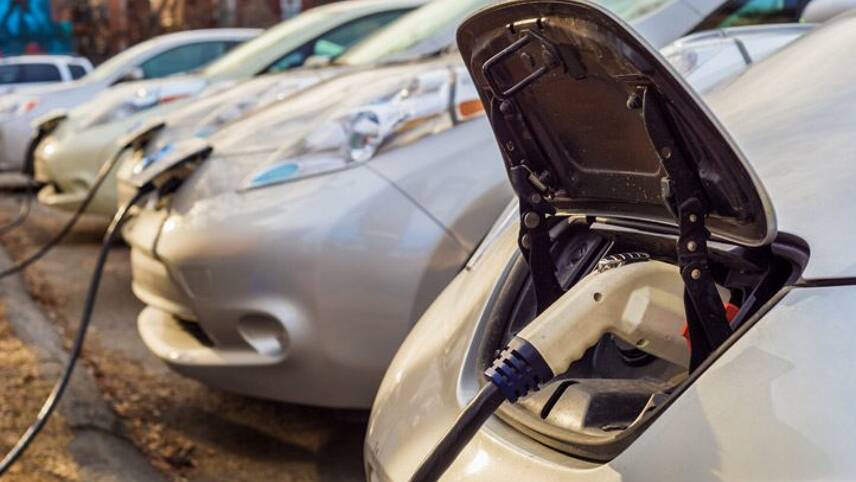Register for free and continue reading
Join our growing army of changemakers and get unlimited access to our premium content

The news from the Government comes in tandem with confirmation the UK has achieved the million EV milestone.
The Department for Transport (DfT) has announced new measures to accelerate the installation of electric vehicle (EV) chargepoints including grants for state-funded schools and nurseries, funds for local authorities and new proposals to boost chargepoint numbers.
The measures have been launched as part of the UK Government’s Plan for Drivers, a 30-point plan unveiled by the Government in October last year, in a bid to speed up the rollout of EV chargepoints across the country.
Today (5 February), schools in Nottinghamshire are set to receive a new grant providing up to 75% of the cost to buy and install chargepoints.
The new grants form part of the DfT’s Workplace Charging Scheme. They are available nationwide for state-funded schools and colleges with dedicated off-street parking facilities as well as nurseries and academies.
Schools will also be able to generate revenue by making their chargepoints available to the public.
Minister for the School System and Student Finance Baroness Barran said: “This is an exciting opportunity for schools across England to become part of an ongoing move towards a greener public sector.
“Schools engaging with this grant will be supporting the development of green infrastructure, helping to improve their local environments.”
Additionally, the Government has launched a consultation to explore ways to speech up chargepoint installations across the UK.
It is proposing changes that would enable EV chargepoint operators to carry out street works using a permit rather than a license.
This is because licenses take longer to get issued and are considerably more expensive to obtain than permits; therefore, reducing costs for operators and accelerating the chargepoint rollout.
To date, more than 53,000 public chargepoints have been installed across the nation. The Government is aiming to host 300,000 public charging points by 2030.
Local Electric Vehicle Infrastructure (LEVI) fund
The Government launched the £381m LEVI fund last year, aiming to accelerate the commercialisation of, and investment in, the local charging infrastructure sector.
The first capital payments from the fund for charging projects have been recently approved to three local authorities outside of London, plus two London Boroughs, bringing the total funding for these areas to more than £14.2m.
Additionally, nearly 100 ‘EV officers’ have been recruited to support chargepoint procurement using the fund.
The Government is also launching the EV infrastructure training course for the officers, in order to support local authorities in building a skilled workforce.
A 2022 report from the Social Market Foundation highlighted that despite a current surplus of technicians, the industry is projected to face a shortage of 25,100 TechSafe-certified technicians specialised in EVs by 2030.
These measures come following the UK’s Zero Emission Vehicle (ZEV) mandate coming into effect earlier this year. The mandate requires 80% of new cars and 70% of new vans sold in the UK to be zero emission by 2030.
UK reaches million EV milestone
In related news, the Society of Motor Manufacturers and Traders (SMMT) has revealed that the UK achieved the million-EV milestone in January this year.
Nearly 21,000 battery electric vehicles (BEVs) were registered last month, demonstrating a 21% year-on-year rise.
Plug-in hybrid vehicles (PHEVs) also recorded volume growth of 31.1%; however, the volume of hybrid vehicles (HEVs) fell by 1.2%.
The SMMT highlights that private buyers in the nation require more support and incentives from the Government to be able to switch to EVs.
Ahead of the Chancellor’s Spring Statement next month, the SMMT is urging the Government to temporarily halve VAT on new BEV purchases.
The Society argues that this would cost the Government less than the money spent in grants while enabling the industry to roll out another million EVs in just the next two years.
SMMT’s chief executive Mike Hawes said: “It’s taken just over 20 years to reach our million EV milestone – but with the right policies, we can double down on that success in just another two.
“Manufacturers have been asked to supply the vehicles, we now ask Government to help consumers buy the vehicles on which net-zero depends.”


Is the infrastructure in place to support such a huge project?
What is involved is the replacement of the petrol fore-court and the supporting refineries with an equivalent electricity network.
What system is it supposed will generate this extra power. The energy has to generated at some point, and in the appropriate form.
Power stations and distribution networks take a long time to build, and are very expensive.
More information on this aspect of the system would be very welcome and interesting.
Does nuclear power, (non-carbon), feature in this system?
i